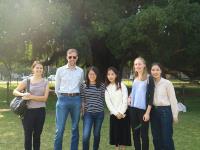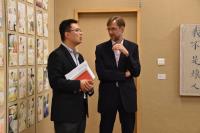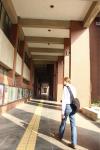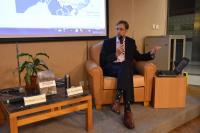|
||
|
||
|
| |||
| 01. 03. 2019 | ISSUE 3 | ||
|
| |||
| CCS Staff in the Spotlight: Dr. Tim Summers | |||||||||
|
We spoke to Dr. Tim Summers about his journey from the world of diplomacy to academia. A former consul-general at the British consulate in Chongqing, Dr. Summers received his PhD from CUHK and has been teaching for several years in the MA in Chinese Studies programme at CCS. He recently published a new book, China's Regions in an Era of Globalization (2018).
What did you do before coming to Hong Kong and joining the Centre for China Studies? I joined the British Foreign Office after I graduated from Cambridge. I opted to work in China because I wanted to learn the language. So, in 1996, I came to Hong Kong to learn Cantonese at CUHK as part of my language training for the Foreign Office. I continued to work at the consulate after the handover, then after a spell in London I was posted in Chongqing as consul-general from 2004 to 2007.
Why did you choose CCS for your PhD and how would you compare the experience with that at Cambridge? I think my time at CCS for the PhD was quite different from when I was at Cambridge for my first degree, so the two cannot be compared. It was a different era of tertiary education: the academic environment and job market were less competitive when I was at Cambridge (very few people pursued master's degrees or did summer internships), and I studied very different subjects; I majored in maths and theology for my first degree. I enjoyed my time at Cambridge and at CCS equally. I joined CCS (then the Centre for East Asian Studies) because the teachers were very helpful and supportive. Professor Ann Huss and Professor Arif Dirlik were both wonderful and open to my research ideas. In addition, CUHK has great resources for people who are interested in studying China—the libraries are great and the Universities Service Centre for China Studies has excellent materials. Of course, being situated in China but in a more open academic environment also adds to the appeal of CCS and CUHK. There are also lots of interesting people coming here frequently to give guest lectures, so it is a stimulating environment to work in. Why did you pay special attention to China and Hong Kong in your diplomatic career and later on in your studies? There are a host of materials which sparked my interest in China. The Chinese theme was not uncommon in British children's literature, and as an undergraduate student I read Chang Jung's Wild Swans as well. I also remember reading Experiences of China by former British diplomat Percy Cradock and finding it fascinating. But the element of chance did play a part in how I ended up focusing on China. I wasn't one of those people who had a specialized interest in culture, such as Ming dynasty pottery or Tang dynasty poetry. For me, I found the politics interesting despite the fact that my very first memory of Chinese politics—the student protests in 1989 and the aftermath—wasn't very positive. In addition to wanting to learn the language, I also intuitively felt, in the mid-1990s, that China was going to be interesting and important in the future. And as a young British diplomat, I considered Hong Kong to be special since it was the dominant issue in Britain's relations with China since the 1970s. I later decided to do a PhD instead of continuing to work as a diplomat because I wanted to learn about China in greater depth. I became aware that despite having worked there for around a decade, I didn't know or understood enough about China. Therefore, I wanted to pursue doctoral studies. Besides, I actually enjoyed reading The China Quarterly when I was a diplomat, which was a good test for me. I thought it was a good sign that I found it stimulating to read a leading academic journal in my field. You teach both undergraduate and postgraduate students. Based on your experience, what are the major similarities and differences between the two groups and how do those distinctions affect your teaching, if at all? What do you find the most enjoyable and challenging in academic life? I like the intellectual challenge of trying to understand and explain what is happening in both my teaching and in my research. You have to know a lot about an issue before you can teach it, which is also why I think teaching and research are symbiotic. I don't think teaching and research are two different things, it would be a mistake to consider them as so. Research should inform and stimulate teaching, and teaching, which involves tailoring materials and thinking of ways to present them, can help with research as well. As for challenges, the simple fact that there is usually a lot going on in academic life already presents a challenge. There is a need to juggle different requirements such as class preparations, grading assignments and trying to find time to write and do research. It does take some management skills. Your research interests include both China and Hong Kong. Are you more optimistic or pessimistic towards their futures, and why? I am optimistic, even though at this point in time, there seems to be cause for more pessimism than optimism in the world as we are going through a dislocating phase in global politics and economy. But what makes me optimistic about China in the long run is the various fundamental strengths China has—it has a well-educated population which is also quite open-minded, entrepreneurial and willing to engage with the world. That does not mean I think China is going to take over the world and start running the world economy, in fact, I don't think anybody is going to run the world in the future, but I am optimistic about China's future. As for Hong Kong, there are indeed challenges as well, but the fundamentals of Hong Kong are why people could be positive about its future. Hong Kong has thrived and flourished in spite of what goes on in China—there are things you can do in Hong Kong that can't be done elsewhere in China because of the rule of law, the international and open environment and an open economic system. It is not guaranteed that it will stay the same, but at the same time there is no reason why that should change. I think it all depends on the political wisdom of the society and I think Hong Kong is able to shape its own future to a certain extent. As the competition in the global job market gets more and more fierce, what advantages do you think CCS students have? And if you could give students one piece of advice which will benefit them the most during their studies, what will it be? Take time to read and re-read. It is of course essential to go to lectures, write assignments and communicate ideas, but the starting point has to be reading. Good graduates from CCS should be able to engage with China and bring in an international perspective. In particular, they should be able to talk, think and write about China using English, which is one of the key features of our programmes. They are also able to study China in Hong Kong, which is different from studying China in North America, where one would be a long way away and not get the integration or the immediate sense of what China is like. It is also different from studying about China in Beijing or Shanghai because one would get both the Chinese and international atmosphere here in Hong Kong, particularly in the academic world.
|
|
||||||||
|
|
|||||||||
|
|
Past Issue
| |
|
|
|
|
|









